七年级英语短语复习答案
- 格式:doc
- 大小:20.62 KB
- 文档页数:48
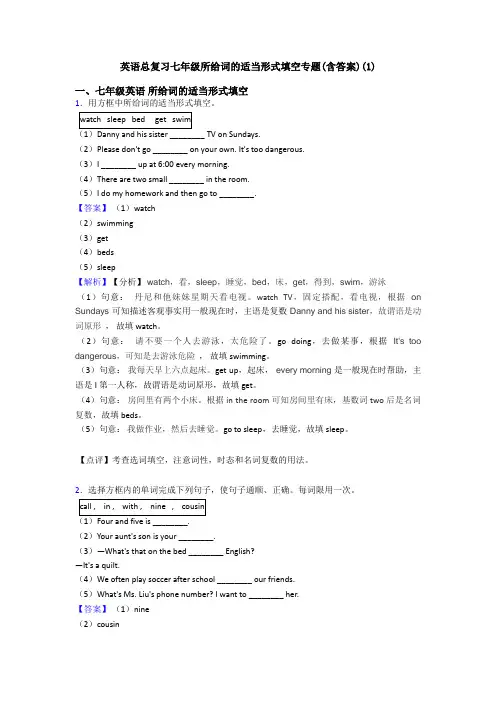
英语总复习七年级所给词的适当形式填空专题(含答案)(1)一、七年级英语所给词的适当形式填空1.用方框中所给词的适当形式填空。
(2)Please don't go ________ on your own. It's too dangerous.(3)I ________ up at 6:00 every morning.(4)There are two small ________ in the room.(5)I do my homework and then go to ________.【答案】(1)watch(2)swimming(3)get(4)beds(5)sleep【解析】【分析】watch,看,sleep,睡觉,bed,床,get,得到,swim,游泳(1)句意:丹尼和他妹妹星期天看电视。
watch TV,固定搭配,看电视,根据on Sundays可知描述客观事实用一般现在时,主语是复数Danny and his sister,故谓语是动词原形,故填watch。
(2)句意:请不要一个人去游泳,太危险了。
go doing,去做某事,根据It's too dangerous,可知是去游泳危险,故填swimming。
(3)句意:我每天早上六点起床。
get up,起床,every morning是一般现在时帮助,主语是I第一人称,故谓语是动词原形,故填get。
(4)句意:房间里有两个小床。
根据in the room可知房间里有床,基数词two后是名词复数,故填beds。
(5)句意:我做作业,然后去睡觉。
go to sleep,去睡觉,故填sleep。
【点评】考查选词填空,注意词性,时态和名词复数的用法。
2.选择方框内的单词完成下列句子,使句子通顺、正确。
每词限用一次。
(2)Your aunt's son is your ________.(3)—What's that on the bed ________ English?—It's a quilt.(4)We often play soccer after school ________ our friends.(5)What's Ms. Liu's phone number? I want to ________ her.【答案】(1)nine(2)cousin(3)in(4)with(5)call【解析】【分析】call打电话;in用;with和;nine九;cousin堂兄(1)句意:4+5=9。
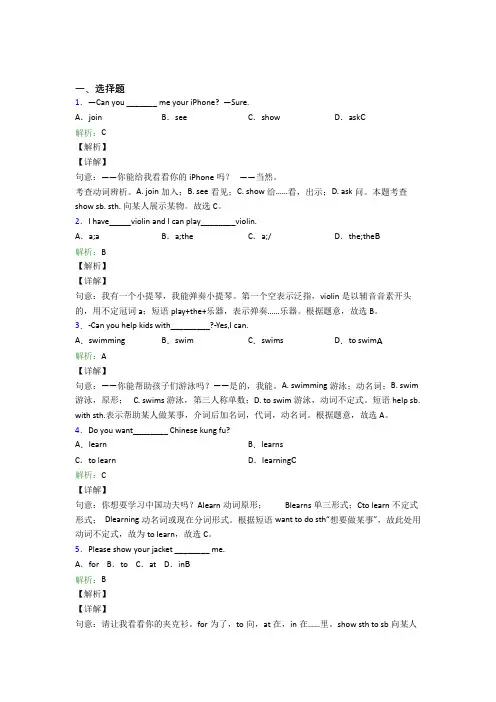
一、选择题1.—Can you _______ me your iPhone? —Sure.A.join B.see C.show D.ask C解析:C【解析】【详解】句意:——你能给我看看你的iPhone吗?——当然。
考查动词辨析。
A. join加入;B. see看见;C. show给……看,出示;D. ask问。
本题考查show sb. sth. 向某人展示某物。
故选C。
2.I have_____violin and I can play________violin.A.a;a B.a;the C.a;/ D.the;the B解析:B【解析】【详解】句意:我有一个小提琴,我能弹奏小提琴。
第一个空表示泛指,violin是以辅音音素开头的,用不定冠词a;短语play+the+乐器,表示弹奏……乐器。
根据题意,故选B。
3.-Can you help kids with_________?-Yes,I can.A.swimming B.swim C.swims D.to swim A解析:A【详解】句意:——你能帮助孩子们游泳吗?——是的,我能。
A. swimming游泳;动名词;B. swim 游泳,原形; C. swims游泳,第三人称单数;D. to swim游泳,动词不定式。
短语help sb. with sth.表示帮助某人做某事,介词后加名词,代词,动名词。
根据题意,故选A。
4.Do you want________ Chinese kung fu?A.learn B.learnsC.to learn D.learning C解析:C【详解】句意:你想要学习中国功夫吗?Alearn动词原形;Blearns单三形式;Cto learn不定式形式;Dlearning动名词或现在分词形式。
根据短语want to do sth“想要做某事”,故此处用动词不定式,故为to learn,故选C。
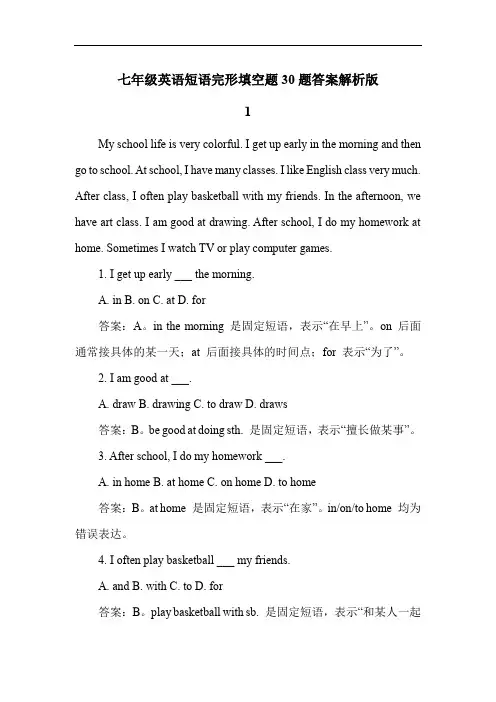
七年级英语短语完形填空题30题答案解析版1My school life is very colorful. I get up early in the morning and then go to school. At school, I have many classes. I like English class very much. After class, I often play basketball with my friends. In the afternoon, we have art class. I am good at drawing. After school, I do my homework at home. Sometimes I watch TV or play computer games.1. I get up early ___ the morning.A. inB. onC. atD. for答案:A。
in the morning 是固定短语,表示“在早上”。
on 后面通常接具体的某一天;at 后面接具体的时间点;for 表示“为了”。
2. I am good at ___.A. drawB. drawingC. to drawD. draws答案:B。
be good at doing sth. 是固定短语,表示“擅长做某事”。
3. After school, I do my homework ___.A. in homeB. at homeC. on homeD. to home答案:B。
at home 是固定短语,表示“在家”。
in/on/to home 均为错误表达。
4. I often play basketball ___ my friends.A. andB. withC. toD. for答案:B。
play basketball with sb. 是固定短语,表示“和某人一起打篮球”。
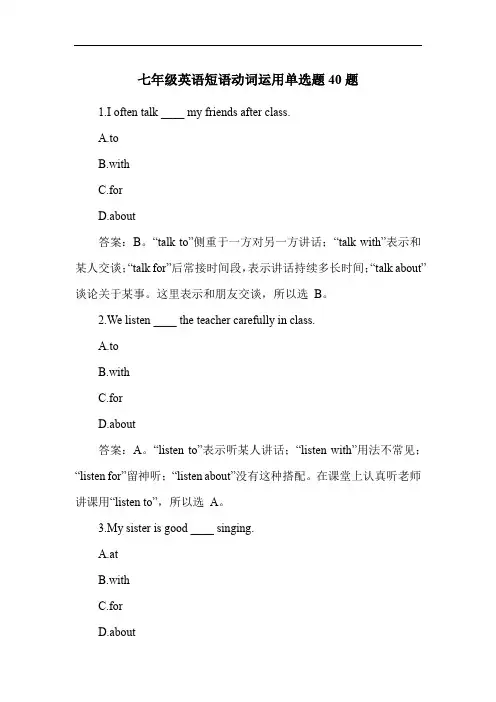
七年级英语短语动词运用单选题40题1.I often talk ____ my friends after class.A.toB.withC.forD.about答案:B。
“talk to”侧重于一方对另一方讲话;“talk with”表示和某人交谈;“talk for”后常接时间段,表示讲话持续多长时间;“talk about”谈论关于某事。
这里表示和朋友交谈,所以选B。
2.We listen ____ the teacher carefully in class.A.toB.withC.forD.about答案:A。
“listen to”表示听某人讲话;“listen with”用法不常见;“listen for”留神听;“listen about”没有这种搭配。
在课堂上认真听老师讲课用“listen to”,所以选A。
3.My sister is good ____ singing.A.atB.withC.forD.about答案:A。
“be good at”擅长做某事;“be good with”善于应付;“be good for”对……有好处;“be good about”对……感到满意。
这里表示擅长唱歌,所以选A。
4.The boy is waiting ____ his mother at the school gate.A.toB.withC.forD.about答案:C。
“wait for”等待某人;“wait to”后面接动词原形,表示等着做某事;“wait with”用法不常见;“wait about”在附近等待。
这里表示等妈妈,所以选C。
5.I want to play basketball ____ school.A.afterB.withC.forD.about答案:A。
“after school”放学后;“play basketball with”和某人打篮球;“play basketball for”为了……打篮球;“play basketball about”没有这种搭配。
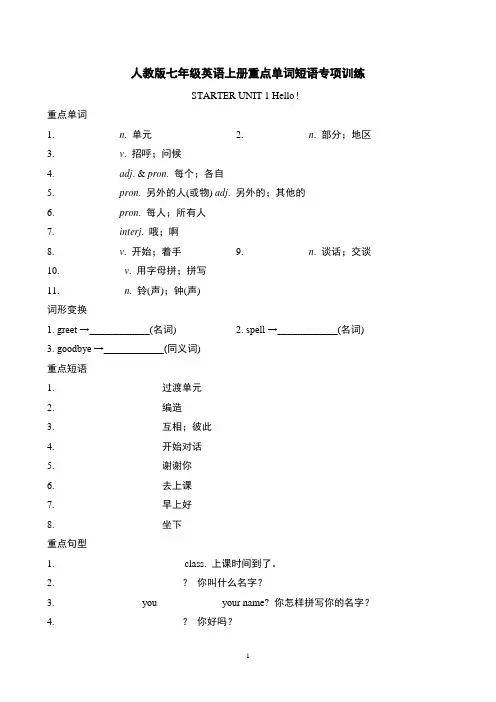
人教版七年级英语上册重点单词短语专项训练STARTER UNIT 1 Hello!重点单词1. ____________ n. 单元2. ____________ n. 部分;地区3. ____________ v. 招呼;问候4. ____________ adj. & pron. 每个;各自5. ____________ pron. 另外的人(或物) adj. 另外的;其他的6. ____________ pron. 每人;所有人7. ____________ interj. 哦;啊8. ____________ v. 开始;着手9. ____________ n. 谈话;交谈10. ____________ v. 用字母拼;拼写11. ____________ n. 铃(声);钟(声)词形变换1. greet →____________(名词)2. spell →____________(名词)3. goodbye →____________(同义词)重点短语1. ____________________ 过渡单元2. ____________________ 编造3. ____________________ 互相;彼此4. ____________________ 开始对话5. ____________________ 谢谢你6. ____________________ 去上课7. ____________________ 早上好8. ____________________ 坐下重点句型1. ________ ________ ________ class. 上课时间到了。
2. ________ ________ ________?你叫什么名字?3. ________ ________ you ____________ your name? 你怎样拼写你的名字?4. ________ ________ ________?你好吗?5. Nice ________ ________ you. 见到你很高兴。
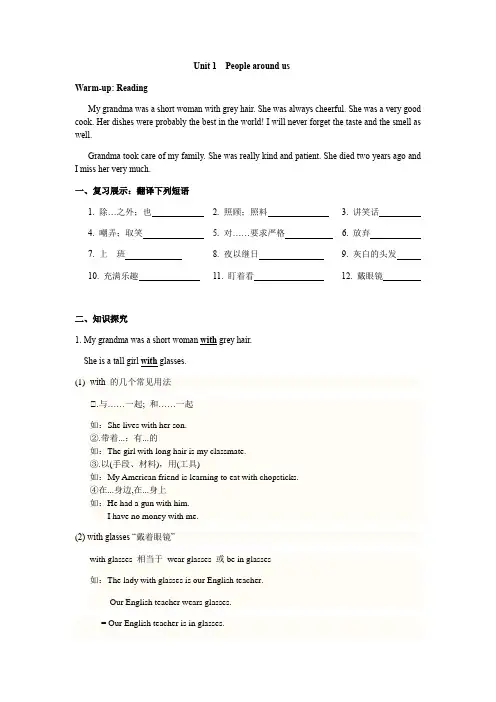
Unit 1 People around usWarm-up: ReadingMy grandma was a short woman with grey hair. She was always cheerful. She was a very good cook. Her dishes were probably the best in the world! I will never forget the taste and the smell as well.Grandma took care of my family. She was really kind and patient. She died two years ago and I miss her very much.一、复习展示:翻译下列短语1. 除…之外;也2. 照顾;照料3. 讲笑话4. 嘲弄;取笑5. 对……要求严格6. 放弃7. 上班8. 夜以继日9. 灰白的头发10. 充满乐趣11. 盯着看12. 戴眼镜二、知识探究1. My grandma was a short woman with grey hair.She is a tall girl with glasses.(1)with 的几个常见用法①.与……一起; 和……一起如:She lives with her son.②.带着...;有...的如:The girl with long hair is my classmate.③.以(手段、材料),用(工具)如:My American friend is learning to eat with chopsticks.④在...身边,在...身上如:He had a gun with him.I have no money with me.(2) with glasses “戴着眼镜”with glasses 相当于wear glasses 或be in glasses如:The lady with glasses is our English teacher.Our English teacher wears glasses.= Our English teacher is in glasses.(3) 固定短语:with one’s help = with the help of sb.【随堂练习】翻译下列句子① 你最好带上雨伞,要下雨了。
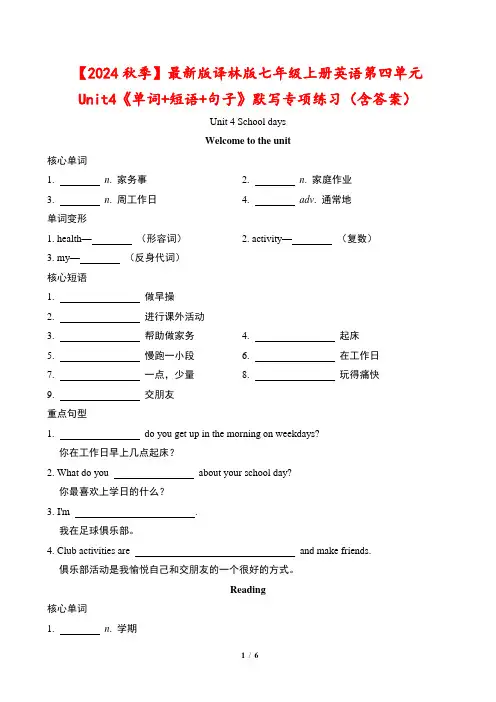
【2024秋季】最新版译林版七年级上册英语第四单元Unit4《单词+短语+句子》默写专项练习(含答案)Unit 4 School daysWelcome to the unit核心单词1. n. 家务事2. n. 家庭作业3. n. 周工作日4. adv. 通常地单词变形1. health—(形容词)2. activity—(复数)3. my—(反身代词)核心短语1. 做早操2. 进行课外活动3. 帮助做家务4. 起床5. 慢跑一小段6. 在工作日7. 一点,少量8. 玩得痛快9. 交朋友重点句型1. do you get up in the morning on weekdays?你在工作日早上几点起床?2. What do you about your school day?你最喜欢上学日的什么?3. I'm .我在足球俱乐部。
4. Club activities are and make friends.俱乐部活动是我愉悦自己和交朋友的一个很好的方式。
Reading核心单词1. n. 学期2. vi. (从……)开始vt. & vt. 开始,着手n. 开头,开端3. n. 语言4. adj. 令人大为惊奇的5. n. 生物学6. n. 大自然;天性7. vi. & vt. 训练;练习8. n. 田,地;领域9. n. 旅行10. vi. & vt. 离开;vt. 使保留11. vt. 采,摘;挑选12. adj. 活着的,活的单词变形1. one—(序数词)2. write—(名词,作家)3. well—(最高级)4. class—(复数)5. work—(复数,著作)核心短语1. 野外考察,实地考察2. 动身去,到……地方去3. 学校足球队4. 说一点儿汉语重点句型1. The Chinese language .汉语言真的令人惊叹。
2. are great fun too!课后活动也很有趣!3. Tomorrow morning we will to pick apples there.明天上午我们将动身前往一个农场,在那里采摘苹果。
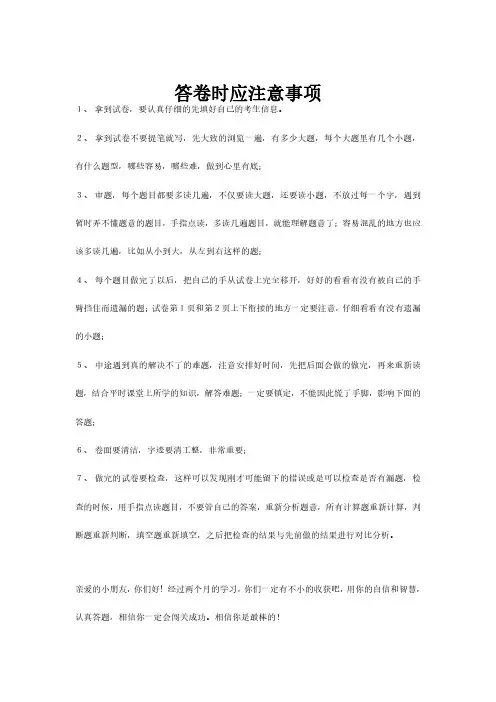
答卷时应注意事项1、拿到试卷,要认真仔细的先填好自己的考生信息。
2、拿到试卷不要提笔就写,先大致的浏览一遍,有多少大题,每个大题里有几个小题,有什么题型,哪些容易,哪些难,做到心里有底;3、审题,每个题目都要多读几遍,不仅要读大题,还要读小题,不放过每一个字,遇到暂时弄不懂题意的题目,手指点读,多读几遍题目,就能理解题意了;容易混乱的地方也应该多读几遍,比如从小到大,从左到右这样的题;4、每个题目做完了以后,把自己的手从试卷上完全移开,好好的看看有没有被自己的手臂挡住而遗漏的题;试卷第1页和第2页上下衔接的地方一定要注意,仔细看看有没有遗漏的小题;5、中途遇到真的解决不了的难题,注意安排好时间,先把后面会做的做完,再来重新读题,结合平时课堂上所学的知识,解答难题;一定要镇定,不能因此慌了手脚,影响下面的答题;6、卷面要清洁,字迹要清工整,非常重要;7、做完的试卷要检查,这样可以发现刚才可能留下的错误或是可以检查是否有漏题,检查的时候,用手指点读题目,不要管自己的答案,重新分析题意,所有计算题重新计算,判断题重新判断,填空题重新填空,之后把检查的结果与先前做的结果进行对比分析。
亲爱的小朋友,你们好!经过两个月的学习,你们一定有不小的收获吧,用你的自信和智慧,认真答题,相信你一定会闯关成功。
相信你是最棒的!人教版初中英语七年级下册六单元讲义教案第一部分【重点短语】watch TV 看报纸在电话上交谈听一张CD唱片使用电脑make soupwash the dishes what about you?kind of boring want to do sth.go to see the movies/go to the movies That sounds good.at home eat outI’d love to. drink teaswim in a pool 端午节live with sb. live in+地点any other night host familymiss his family wish(sb.)to do sth.there’s no place like home. study for a test【答案】看电视;read newspaper; talk on the phone; use the computer;熬汤;洗碗;你怎么样?;有点无聊;想做某事;去看电影;那听起来不错;在家;在外面吃;我愿意;喝茶;在游泳池里游泳;the Dragon Boat Festival; 跟……一起住;住在……;其他任一天晚上;寄宿家庭;思念他的家人;希望某人做某事;哪都不如自己家;为考试做准备第二部分【重点语法】1、现在(说话的瞬间)正在进行或发生的动作,强调“此时此刻”I am speaking now.2、当前阶段正在进行的动作,强调“现阶段”。
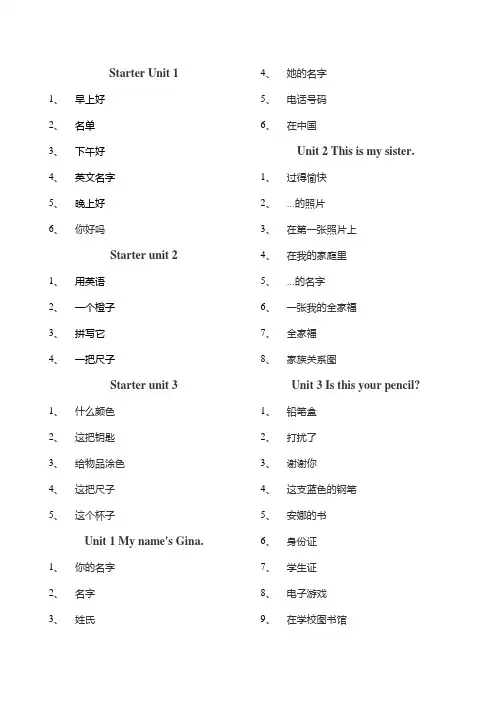
Starter Unit 11、早上好___________________2、名单___________________3、下午好___________________4、英文名字___________________5、晚上好___________________6、你好吗___________________ Starter unit 21、用英语__________________ _2、一个橙子__________________ _3、拼写它__________________ _4、一把尺子__________________ _Starter unit 31、什么颜色__________________ _2、这把钥匙__________________ _3、给物品涂色__________________ _4、这把尺子__________________ _5、这个杯子__________________ _Unit 1 My name's Gina.1、你的名字__________________ _2、名字__________________ _3、姓氏___________________4、她的名字___________________5、电话号码___________________6、在中国___________________Unit 2 This is my sister.1、过得愉快___________________2、…的照片___________________3、在第一张照片上___________________4、在我的家庭里___________________5、…的名字___________________6、一张我的全家福___________________7、全家福___________________8、家族关系图___________________Unit 3 Is this your pencil?1、铅笔盒___________________2、打扰了___________________3、谢谢你___________________4、这支蓝色的钢笔___________________5、安娜的书___________________6、身份证___________________7、学生证___________________8、电子游戏___________________9、在学校图书馆___________________10、向…要…__________________ _11、给某人发电子邮件__________________ _12、给某人打电话__________________ _13、丢失某物__________________ _14、拾到某物__________________ _15、一串钥匙__________________ _16、失物招领__________________ _Unit4 Where's my school bag?1、在沙发上__________________ _2、在书包里__________________ _3、在床底下__________________ _4、快点__________________ _5、整洁的__________________ _6、录音机__________________ _7、飞机模型__________________ _8、有一个时钟__________________ _Unit5 Do you have a soccer ball?1、英式足球__________________ _2、一个网球拍__________________ _3、打篮球__________________ _4、棒球棒__________________ _5、参加体育运动或比赛___________________ 6、看电视___________________7、在我的包里___________________8、迟到___________________9、电视上___________________10、听起来不错___________________11、让我们…吧___________________Unit6 Do you like bananas?1、生日晚餐___________________2、下周___________________3、思考、考虑___________________4、怎么样___________________5、一些水果___________________6、他的生日___________________7、体育明星___________________8、饮食习惯___________________9、作为早餐___________________10、作为晚餐___________________11、最后一个问题___________________12、健康的食品___________________13、想要做某事___________________Unit7 How much are these socks?1、多少钱___________________2、七美元___________________3、服装店__________________ _4、以很低的价格__________________ _5、对于男孩子__________________ _6、红色的裙子__________________ _7、大降价!__________________ _8、一双__________________ _9、从某人那买某物__________________ _10、把某物卖给某人__________________ _11、给你__________________ _Unit 8 When is your birthday?1、生日快乐__________________ _2、多大年纪__________________ _3、在八月__________________ _4、再见__________________ _5、英语测试__________________ _6、学校郊游__________________ _7、篮球比赛__________________ _8、艺术节__________________ _9、举办一次英语聚会__________________ _10、玩的愉快__________________ _Unit9 My favorite subject is science.1、最喜欢的学科__________________ _2、体育老师___________________3、玩游戏___________________4、第二天___________________5、在星期一___________________6、上数学课___________________7、上一节美术课___________________8、两个小时___________________9、和某人玩游戏___________________10、喜欢做某事___________________短语参考答案Starter Unit1 Starter Unit1早上好good morning名单name list下午好good afternoon英文名字an English name晚上好good evening你好吗How are youStarter unit2 Starter unit2用英语in English一个橙子an orange拼写它spell it一把尺子a rulerStarter unit3 Starter unit3什么颜色What color这把钥匙the key给物品涂色color the thing这把尺子the ruler这个杯子the cupUnit1 My name's Gina. Unit1 My name's Gina.你的名字your name名字first name姓氏last name她的名字her name电话号码telephone /phone number在中国in ChinaUnit2 This is my sister. Unit2 This is my sister.过得愉快have a good day…的照片 a photo of …在第一张照片上in the first photo在我的家庭里in my family…的名字he name of …一张我的全家福a photo of my family全家福family photo家族关系图family treeUnit3 Is this your pencil? Unit3 Is this your pencil?铅笔盒pencil box打扰了excuse me谢谢你thank you这支蓝色的钢笔the blue pen安娜的书Anna’s book身份证ID card学生证school ID card电子游戏computer game在学校图书馆in the school library向…要…ask…for …给某人发电子邮件e-mail sb给某人打电话call sb丢失某物lose sth拾到某物find sth一串钥匙a set of keys失物招领lost and foundUnit4 Where's my school bag? Unit4 Where's my school bag?在沙发上on the sofa在书包里in the schoolbag在床底下under the bed快点come on整洁的be tidy录音机tape player飞机模型model plane有一个时钟have a clockUnit5 Do you have a soccerball? Unit5 Do you have a soccerball?英式足球soccer ball一个网球拍a tennis bat打篮球play basketball棒球棒baseball bat参加体育运动或比赛play sports看电视watch TV在我的包里in my bag迟到be late电视上on TV听起来不错That sounds good让我们…吧Let’s=Let usUnit6 Do you like bananas? Unit6 Do you like bananas?生日晚餐birthday dinner下周next week思考、考虑think about怎么样how about一些水果some fruit他的生日his birthday体育明星sport star饮食习惯eating habits作为早餐for breakfast作为晚餐for dinner最后一个问题one last question健康的食品healthy food想要做某事want to do sthUnit7 How much are these socks? Unit7 How much are these socks?多少钱how much七美元seven dollars服装店clothes store以很低的价格at very good prices对于男孩子for boysskirts in red大降价!Big Sale!一双a pair of从某人那买某物buy sth from sb.把某物卖给某人sell sth to sb.给你Here you areUnit 8 When is your birthday? Unit 8 When is your birthday?生日快乐happy birthday多大年纪how old在八月in August再见see you英语测试English test学校郊游school trip篮球比赛basketball game艺术节art festival举办一次英语聚会have an English party玩的愉快have a good timeUnit9 My favorite subject is science. Unit9 My favorite subject is science.最喜欢的学科favorite subject体育老师P.E. teacher玩游戏play games第二天the next day在星期一on Mondayhave math上一节美术课have an art lesson两个小时for two hours和某人玩游戏play games with sb.喜欢做某事like to do/doing sth.。
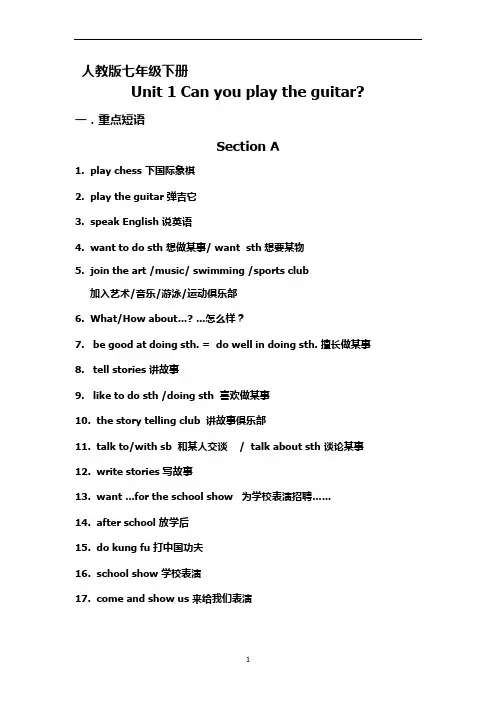
人教版七年级下册Unit 1 Can you play the guitar? 一.重点短语Section A1. play chess 下国际象棋2. play the guitar 弹吉它3. speak English 说英语4. want to do sth 想做某事/ want sth想要某物5. join the art /music/ swimming /sports club加入艺术/音乐/游泳/运动俱乐部6. What/How about…? …怎么样?7. be good at doing sth. = do well in doing sth. 擅长做某事8. tell stories 讲故事9. like to do sth /doing sth 喜欢做某事10. the story telling club 讲故事俱乐部11. talk to/with sb 和某人交谈 / talk about sth 谈论某事12. write stories 写故事13. want …for the school show 为学校表演招聘……14. after school 放学后15. do kung fu 打中国功夫16. school show 学校表演17. come and show us 来给我们表演Section B1.play the drums /piano/ violin敲鼓/弹钢琴/拉小提琴play the +西洋乐器弹/拉……乐器play +棋类/球类下……棋,打……球2. be good with sb善于应付…的;和某人相处很好be good to sb 对某人好 / be good for对……有益处,有好处3. make friends 结交朋友4. play soccer/football 踢足球5. help sb. with sth 在某方面帮助某人help sb to do sth 帮助某人做某事with one’s help 在某人的帮助下6. play games 做游戏7. on the weekend/on weekends 在周末8. like to do sth. =love to do sth. 喜欢/喜爱做某事9. be free =have time有空/ be busy很忙10. call sb. at…拨打某人的……号码11. need sb./sth. to do…需要某人/某物做……sb need to do sth某人需要做某事sth need doing sth 某物需要被做12. English-speaking students 说英语的学生13. the Students Sports Center学生运动中心14. be in= join in …成为…中的一员二.重点句型1. Can you/he swim? Yes, I /he can. / No, I/he can’t.2. What club do you want to join? I want to join the chess club.3. What can you do? I can /can’t sing .4. You can join the English club.5. Sounds good./That sounds good.6. Are you be good with old people?7. Do you have time on the weekend?8. Please call Mrs. Miller at 555-3721.三.语法透析情态动词can的用法1.意义“Can”意为“能;会”, 是情态动词,没有人称和数的变化,不能单独做谓语,只能和实义动词原形或be动词原形一起构成谓语。
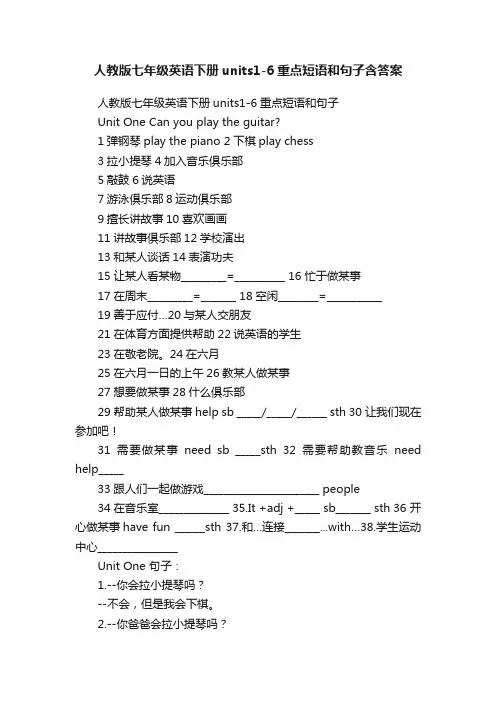
人教版七年级英语下册units1-6重点短语和句子含答案人教版七年级英语下册units1-6重点短语和句子Unit One Can you play the guitar?1弹钢琴play the piano 2下棋play chess3拉小提琴4加入音乐俱乐部5敲鼓6说英语7游泳俱乐部8运动俱乐部9擅长讲故事10喜欢画画11讲故事俱乐部12学校演出13和某人谈话14表演功夫15让某人看某物_________=__________ 16忙于做某事17在周末_________=_______ 18空闲________=___________19善于应付…20与某人交朋友21在体育方面提供帮助22说英语的学生23在敬老院。
24在六月25在六月一日的上午26教某人做某事27想要做某事28什么俱乐部29帮助某人做某事help sb _____/_____/______ sth 30让我们现在参加吧!31需要做某事need sb _____sth 32需要帮助教音乐need help_____33跟人们一起做游戏_______________________ people34在音乐室______________ 35.It +adj +_____ sb_______ sth 36 开心做某事have fun ______sth 37.和…连接_______...with…38.学生运动中心________________Unit One 句子:1.--你会拉小提琴吗?--不会,但是我会下棋。
2.--你爸爸会拉小提琴吗?--是的,他会。
3.--你想加入什么俱乐部?--我想加入艺术俱乐部。
4.我妈妈擅长讲故事。
5.他可以加入讲故事俱乐部。
6.我的弟弟喜欢画画。
7.--你弟弟会干什么?--他会打篮球。
8.那么,你可以参加我们学校的音乐节。
9.张平会说英语还会弹钢琴。
10.我们需要你在运动方面提供帮助。
11.你和老人们相处得好吗?12.我们交朋友吧。
七年级英语短语完形填空题60题(带答案)1My School LifeI am a student. I go to school five days a week. My school is very big and beautiful. There are many classrooms, a library, a playground and a canteen. I like my school very much.I have many friends at school. We often play games and do sports together. We also help each other with our studies. My favorite subject is English. I think it is very interesting.I am good at English. I can speak, read and write English well. I often read English books and watch English movies. I also like to listen to English songs.1. There are many classrooms, a library, a playground and a canteen. My school is very ___ and beautiful.A. bigB. smallC. oldD. new答案:A。
根据上文“There are many classrooms, a library, a playground and a canteen.”可知学校很大,且后面有“and beautiful”,与“big”相呼应。
“small”小;“old”旧;“new”新,均不符合语境。
七年级英语连词短语练习题30题1.She is good at math and she is good at English, too.A.andB.butC.orD.so答案:A。
本题考查并列连词and 的用法。
题干中表示她既擅长数学又擅长英语,“and”表示并列关系,符合题意。
“but”表示转折关系;“or”表示选择关系;“so”表示因果关系。
2.He likes playing basketball and he likes playing football.A.andB.butC.orD.for答案:A。
题干中说他喜欢打篮球并且也喜欢踢足球,“and”用于连接两个并列的动作,正确。
“but”转折;“or”选择;“for”因为。
3.She can sing and she can dance.A.andB.butC.orD.so答案:A。
她会唱歌并且会跳舞,“and”连接两个并列谓语,合适。
“but”表转折不符;“or”表选择不对;“so”表因果不恰当。
4.They are in the same class and they are good friends.A.andB.butC.orD.so答案:A。
他们在同一个班级并且是好朋友,“and”连接两个并列的情况,正确。
“but”转折不合适;“or”选择不对;“so”因果关系错误。
5.I have a pen and a pencil.A.andB.butC.orD.so答案:A。
我有一支钢笔和一支铅笔,“and”连接两个并列的物品,正确。
“but”转折不恰当;“or”选择不符;“so”因果错误。
6.He is tall and strong.A.andB.butC.orD.so答案:A。
他又高又壮,“and”连接两个并列的形容词,恰当。
“but”转折不合适;“or”选择不对;“so”因果关系错误。
7.She studies hard and gets good grades.A.andB.butC.orD.so答案:A。
一、选择题1.—Where is the bank?—________.A.It's black B.It's interesting C.It's next to the park D.It's great C解析:C【解析】句意:----银行在哪里?-----就在公园旁边。
A. It's black它是黑色的;B. It's interesting它是有趣的;C. It's next to the park它紧挨着公园;D. It's great它很好。
结合句意和语境可知选C。
2.Mary wants to join the sports club because she enjoys __________ basketball.A.play B.playing C.to play D.to playing B解析:B【详解】句意:玛丽想加入体育运动俱乐部,因为她喜欢打篮球。
考查固定搭配。
A. play动词原形;B. playing动名词;C. to play动词不定式;D. to playing介词+动名词。
enjoy doing sth.为固定搭配,意为“喜欢做某事”,符合句意,故选B。
3.My house is ________the shop.A.to B.through C.across from D.pass C解析:C【详解】句意:我的房子在商店的对面。
本题考查介词。
to向,through通过,across from在……的对面,pass经过,是动词。
此处作为系动词is的表语,用介词短语,结合句意,我家在商店的对面,故选C。
4.— Are there any boys in the classroom now? — Yes, ________.A.there’re B.there are C.there aren’t any D.they are B解析:B【详解】句意:——现在教室里有男生吗?——是的,有一些。
七年级英语动名词短语练习题30题1.She is good at ____ basketball.A.playB.playingC.playsD.to play答案:B。
“be good at doing sth”是固定用法,表示擅长做某事,所以选playing。
2.He spends a lot of time ____ books.A.readB.readingC.to readD.reads答案:B。
“spend time doing sth”是固定用法,表示花费时间做某事,所以选reading。
3.My hobby is ____ stamps.A.collectB.collectingC.collectsD.to collect答案:B。
“be 动词+动名词”表示一种爱好,所以选collecting。
4.They enjoy ____ games after school.A.playB.playingC.playsD.to play答案:B。
“enjoy doing sth”是固定用法,表示喜欢做某事,所以选playing。
5.I am interested in ____ pictures.A.drawB.drawingC.drawsD.to draw答案:B。
“be interested in doing sth”是固定用法,表示对做某事感兴趣,所以选drawing。
6.We love ____ music.A.listenB.listeningC.listensD.to listen答案:B。
“love doing sth”是固定用法,表示喜爱做某事,所以选listening。
7.She starts ____ English at seven o'clock.A.studyB.studyingC.studiesD.to study答案:B。
“start doing sth”表示开始做某事,所以选studying。
. 1. Have you heard "You are never too old to learn"? 2. Remember not to drop litter everywhere. 3. It's wrong to pick flowers in the park 4. Don't leave the tap running while brushing your teeth 5. It's not polite to cut in on others. 6. Do people here obey traffic rules? 7. You are old enough to learn good manners. 1. Do British people greet relatives and friends with a kiss? 2. You should start a conversation in a proper way. 3. She told us to avoid subjects like age and money. 4. It's rude to push in before others. . 5. We are old enough to learn how to behave politely in public. 6. I'm so sorry that I bumped into you/to bump into you. 1. If they are in your way, do not touch them or push past them 2. Just as the saying goes, "When in Rome, do as the Romans do". 3. It's good to keep your voice down in public. 4. You should avoid cutting in while others are talking. 5. Here are some tips for you about how to behave politely. 6. Please say sorry when you bump into/hit someone by accident. 1. I am too excited to express himself clearly. 2. Peter was too slow to write down all the main points. 3. Kitty was too busy talking with others to listen to the radio. 4. British people are too polite to laugh loudly in public. 5. Sandy is careful enough to notice small changes around her. 6. Suzy was too shy to join(in) the discussion. 1. Public signs are used to warn people of danger in public places. 2. We should keep/protect our children from danger. 3. A friend in need is a friend indeed. 4. He is patient enough to explain everything to us. 5. You'd better not shout loudly in the library. 6. I didn't notice that sign until he told me. 7. He risked losing everything all at a time and left here. . 1. The purpose of the talk is to teach students rules for eating. 2. There will be a lot of advice on table manners. 3. It's impolite to make too much noise while eating. 4. Above all, you shouldn't talk with food in your mouth. 5. Make sure both guests and hosts feel comfortable at the table. 6. British people only greet relatives or close friends with a kiss. 7. He is too polite to laugh loudly in public (places). 8. Cutting in on others is not a proper way to start a conversation 9. We should avoid talking about age. 七. We are going to hold a talk on good table manners next Friday. It will take place at 2: 30 p. m in the school hall. There will be much advice on table manners. Above all, you shouldn't start eating until everyone is ready. Second, it is impolite to make too much noise while eating. Also, you should not talk with food in your mouth. Finally, always remember to wait for everyone to finish before you leave the table These rules are important because we should make sure that both guests and hosts are comfortable at the table. 1. He is too polite to push in before others. 2. Don't talk loudly in public (places). 3. Above all, you must keep/protect yourself from danger. 4. Excuse me, can I join(in) your discussion? 5. The boy is clever enough to express himself clearly. 七. British people say "hello" or "nice to meet you" or shake your hand when they meet you for the first time They like to talk about weather, holidays or something else and avoid talking about age and weight. They say "please" and "thank you" all the time even at home. They always behave politely while eating and they wait for everyone to finish before they leave the table. I think these tips are very helpful to us. Good manners can bring us many friends. U6 1. They are training to be volunteers for the Olympic Games. 2. It's meaningful to do something for the elderly/elderly people 3. We'll find some other ways to support disabled people. 4. They have provided special places for homeless people to stay. 5. I need you to write to the local government. 6. We also need more people to help those disabled people